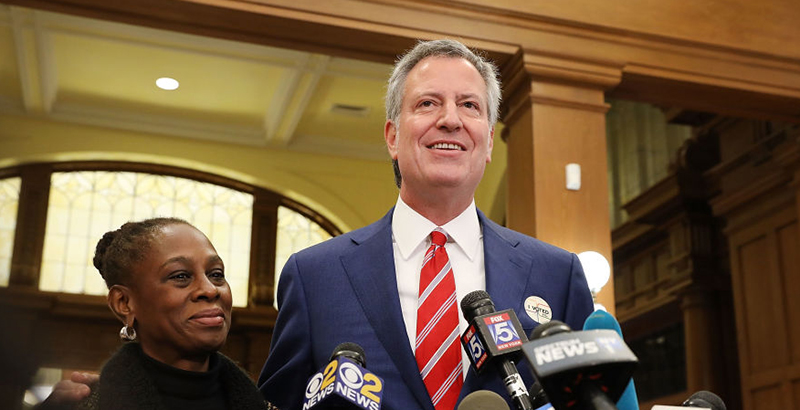The Would-Be Education Mayor: 4 Ways Bill de Blasio Can Elevate New York City’s Schools During His Second Term

Dear Mayor de Blasio:
Congratulations on your re-election, and for becoming the first Democratic mayor in New York City to win a second term since Cornelius Van Steenwyk in 1682, something like that. Your opponents were mediocrities, true, and voters weren’t moved, lifting you to a victory margin associated with 15-term congressmen. Still, if people thought they could beat you, they would have run; even with turnout low, I totally get why you’re boasting about your mandate.
On behalf of the tri-state area, I urge you to use it as fearlessly as possible. You seem psyched to do that: right out of the gate you said you were going to make New York “the fairest big city in America.”
Most of the city’s public school students need a lifetime application of fairness: a million make their way every morning to public schools of wildly varying quality; fewer than half are proficient in reading and math; most need remediation if they enter college; most don’t finish.
“We need the school system to look entirely different in the coming years,” you said last week. “That is the mission I will be most focused on, that will be the issue I put my greatest passion and energy into.”
I hope you engage schools with that much intensity. There’s always the next job to worry about, but insofar as it can ever be true, there’s nothing now to lose and you have lots of capital to spend. And all sides agree, I think, that urban education is a disaster for poor kids.
You get one big effort, and smaller ones. There are a few suggestions below: the criteria were reaching the largest number plus doability. Nothing here targets important but politically stalemated problems like the Renewal Schools turnaround initiative, the Absent Teacher Reserve, class size, budgets, or charter school expansion. No dedicated interest group yet opposes these few proposals.
The usual caveats: There are no single-prong solutions, and you never finish a big reform — you only make progress.
Desegregate schools. This could be your great second-term project. When you were expected to deliver a “bigger vision” on desegregation last spring, you blinked, and tossed off a plan so lackluster you didn’t show up to defend it. It was equivalent to a civil rights worker asking politely for a seat at the luncheon counter. (Some felt the administration was on the right course, though.)
But you’re no longer facing an election, and you believe in the cause; progressives believe; all civil people believe once they’re sure it won’t hurt them. There’s tons of research showing that desegregated schools lift the performance of poor and minority kids without detracting — very important in the leafy districts of Brooklyn and Manhattan — from the performance of affluent high achievers.
Actually, desegregated schools don’t only improve academic achievement: Researchers find they also reduce crime (court-ordered desegregation) and improve adult health and earnings outcomes.
You don’t have to be a Bernie Bro to imagine major uplift potential here. Both economically and racially, New York is one of the most segregated cities in a nation of segregated cities. According to a March 2017 report by the Urban Institute, New York is the most economically segregated city in the United States.
You say that creating integrated schools will take decades, which is true; that residential segregation presents vast difficulties, also true (though black segregation in schools has persisted here when residential segregation declined); that students need a better education “right now.” So true. But it’s not zero-sum — your panoramic Equity and Excellence for All program is designed to help now in lots of ways.
If you’re not going to take something on unless you’re sure you’ll have conclusive results in four years, schools aren’t your game. As you observed when people criticized the small beer gains of the Chateaux Margaux–priced Renewal program, the reform clock runs at a fraction of the pace of the political clock.
The managerial, operational, political, and tribal challenges are obviously immense (even a local fix is a battle). As a start, how about calling the problem “segregation,” a word that doesn’t appear in the city’s plan to eradicate it. “Diversity” has its uses, but so does Orwell’s dictum that political language exists “to give an appearance of solidity to pure wind.”
Build transparency for UPK. Your hallmark first-term achievement can’t stand around accepting pats on the back for four years. Parents, policymakers, and the public need to be able to evaluate the universal pre-K initiative on markers besides enrollment (congratulations on that, though). How does oversight work? What’s the rubric for evaluating quality? What sorts of trends among providers, parents, and children is the city seeing? Are there differences in quality, success, attendance, or other measures depending on the background of the children? These are questions you may be asking as you build the 3K program.
Add concierges to the Turning 5 process. The transition from pre-K special education to special education in kindergarten is grueling and confusing, dreaded by parents. The pre-K and kindergarten systems aren’t integrated, and pre-K students are evaluated anew in the spring of their final pre-K year. They may receive different or fewer services. Parents whose children have complicated learning or medical needs need to find placements with little guidance. Most parents rely on other parents to find information, which makes those with little social capital especially vulnerable and less likely to find a suitable placement for their child. Parents should have dedicated, personalized guidance; concierge should be a staff position.
Use research. The city isn’t alone in launching initiatives or adopting practices that have little or no evidentiary support. Many of the most widely held beliefs about education, and major reforms — from the federal level on down — were implemented without objective reasons to believe they would work, and weren’t modified despite subsequent evidence that they weren’t working well.
Your administration is a particularly obvious example. You selected the community school model as the district’s lever for turnaround despite middling academic results in community schools, which provide health care and social services as well as academics. Balanced literacy, which some studies have shown to be less effective than other ways of teaching reading, especially for disadvantaged students, continued to be touted by the chancellor for use in poor schools. Department of Education officials dismissed without elaboration two studies using different methodologies that found Renewal schools to be ineffective.
If research doesn’t guide policy, one of these does: politics, tradition, laziness, sentimentality. None of them will make schools better. It’s true that if you want to be remembered like mayors La Guardia and Steenwyk, you need rousing rhetoric. But you’ll also need facts.
Get stories like these delivered straight to your inbox. Sign up for The 74 Newsletter

;)
